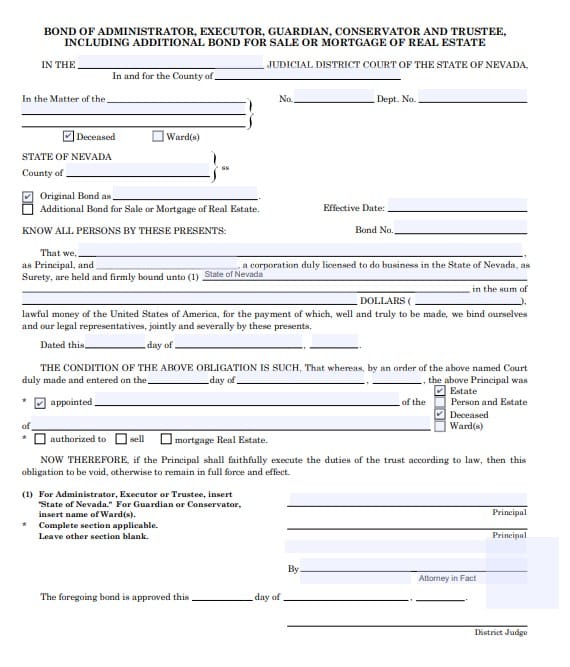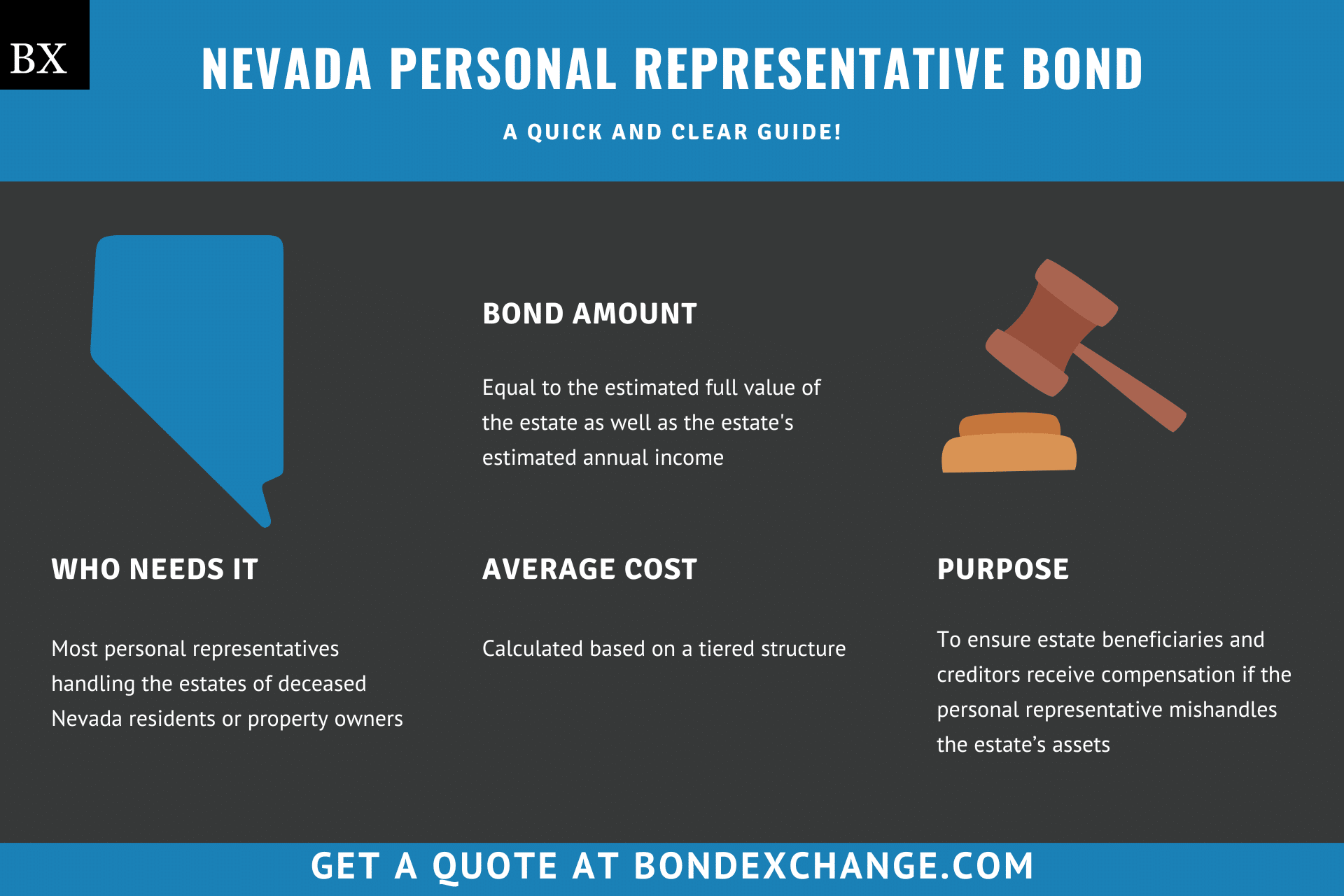Nevada Personal Representative Bond: A Comprehensive Guide
This guide provides information for insurance agents to help their customers obtain a Nevada Personal Representative bond.
At a Glance:
- Average Cost: Calculated based on a tiered structure
- Bond Amount: Determined on a case-by-case basis (more on this later)
- Who Needs it: Most personal representatives handling the estates of deceased Nevada residents or property owners
- Purpose: To ensure estate beneficiaries and creditors receive compensation if the personal representative mishandles the estate’s assets
- Who Regulates Personal Representatives in Nevada: The district court of the county with jurisdiction over where the deceased individual resided or had property

Background
Nevada Statute 142.010 requires all personal representatives of an estate to be appointed by a court before assuming their fiduciary duties. The Nevada legislature enacted the appointment requirement to ensure that personal representatives do not mismanage the estate’s assets. To provide financial security for the enforcement of this requirement, the court may require a personal representative to purchase and maintain a probate surety bond to be eligible for appointment.
What is the Purpose of the Nevada Personal Representative Bond?
Nevada requires personal representatives to purchase a surety bond as a prerequisite to being appointed as a fiduciary over an estate’s assets. The bond ensures that the estate’s beneficiaries and creditors will receive compensation for financial harm if the personal representative fails to abide by the regulations outlined in Nevada Statute 142.020. Specifically, the bond protects beneficiaries and creditors if the personal representative mismanages the estate’s assets. In short, the bond is a type of insurance that protects the estate’s beneficiaries and creditors if the personal representative violates their fiduciary duties.
How Can an Insurance Agent Obtain a Nevada Personal Representative Surety Bond?
BondExchange makes obtaining a Nevada Personal Representative bond easy. Simply login to your account and use our keyword search to find the “Probate” bond in our database. Don’t have a login? Gain access now and let us help you satisfy your customers’ needs. Our friendly underwriting staff is available by phone (800) 438-1162, email or chat from 7:30 AM to 7:00 PM EST to assist you.
At BondExchange, our 40 years of experience, leading technology, and access to markets ensures that we have the knowledge and resources to provide your clients with fast and friendly service whether obtaining quotes or issuing bonds.
Not an agent? Then let us pair you with one!

Click the above image to find a BX Agent near you
How is the Bond Amount Determined?
Nevada Statute 142.020 dictates that the bond amount must be equal to the estimated value of all personal property belonging to the estate and the estimated income to be generated from the estate’s real or personal property during the next year. However, the statute also grants the court the authority to alter the required bond amount if they deem it necessary, if the bond amount is specified in the will, or if any interested person petitions the court to increase it.
What are the Underwriting Requirements for the Nevada Personal Representative Bond?
Most surety companies will examine the following factors when determining eligibility for the Nevada Personal Representative bond:
- Personal representative’s credit history (not considered for bonds with limits less than $25,000)
- Whether or not the estate has an attorney (not considered for bonds with limits less than $25,000)
- How long the fiduciary appointment is for
- Whether or not the personal representative is replacing a prior fiduciary
- If the personal representative has ever committed a felony
- If there are disputes among the estate’s beneficiaries
- Whether or not there is any ongoing business in the estate
- If the bond is being required by a creditor
How Much Does the Nevada Personal Representative Bond Cost?
Surety companies typically determine the premium rate for personal representative bonds based on a tiered structure. As a result, larger bond amounts will be charged a lower premium rate than smaller bonds.
The following table illustrates the pricing structure for the Nevada Personal Representative bond:
$1,500,000 Executor Bond Cost
| Bond Amount | Premium Rate | Total Bond Cost |
|---|---|---|
| First $20,000 | 0.75% | $150 |
| Next $40,000 | 0.60% | $240 |
| Next $140,000 | 0.50% | $700 |
| Next $300,000 | 0.375% | $1,125 |
| Next $1,000,000 | 0.25% | $2,500 |
| Total cost of $4,715 |
Who is Required to Purchase the Nevada Personal Representative Bond?
Nevada Statute 14.020 grants the district court the authority to determine whether or not a personal representative must be bonded. When deciding whether or not a personal representative must purchase a bond, the court will consider factors such as the size of the estate, the number of beneficiaries, and whether or not the will is contested.
Personal representatives are not required to purchase a surety bond if:
- The court deems it unnecessary
- The estate’s personal assets are deposited with a domestic financial institution and cannot be accessed without a court order
To paraphrase Nevada Statute 132.265, a personal representative is a court-appointed fiduciary responsible for administering a deceased individual’s estate. Personal representatives are referred to as executors if the deceased individual nominated them in their will, or administrators if they were not nominated in the will or if no will exists.

How do Personal Representatives Become Appointed in Nevada?
Personal representatives in Nevada must navigate several steps to become court-appointed fiduciaries. Below are the general guidelines, but applicants should refer to Nevada’s probate statutes (Title 12) for details on the process.
Step 1 – Meet the Qualifications
Persons are ineligible to serve as a personal representative if they:
-
- Are under the age of 18
- Have been convicted of a felony (unless the court deems their conviction is not disqualifying)
- Have a conflict of interest or are deemed incapable
- Are an out-of-state resident or bank (unless they partner with a resident bank or individual as co-executor or appoint a substitute executor)
Step 2 – Determine Priority
Priority to serve as a personal representative shall be granted in the following order:
-
- Executors nominated in the will
- Surviving spouse
- Surviving children
- Parents of the deceased
- The deceased’s siblings
- The deceased’s grandchildren
- Any other kin entitled to the estate’s assets
- The public administrator or persons employed or contracted to fulfill those duties
- Any creditor
- Persons in any way related to the deceased
- Any qualified person
Step 3 – Hire an Attorney
Although not explicitly required, it is highly recommended that personal representatives hire an attorney to assist with the probate process.
Step 4 – Contact the Court
Personal representatives must contact the district court of the county with jurisdiction over the deceased individual’s estate. A representative of the court will walk the personal representative through the appointment process, provide them with all required forms, and answer any questions they may have.
The court will hold a hearing to examine the will, and if there is no will, determine the personal representative’s qualifications and priority. Any interested person may object to the personal representative’s appointment.
Step 5 – Purchase a Surety Bond
Unless otherwise exempt, personal representatives must purchase and maintain a surety bond (limits outlined above).
How do Nevada Personal Representatives File Their Bonds?
Personal representatives should submit their completed bond forms, including the power of attorney, to the district court of the county with jurisdiction over the estate.
The surety bond requires signatures from the company that issues the bond and the personal representative. The surety company should include the following information on the bond form:
- Court where the bond is to be filed
- Name of the deceased individual
- Date the bond goes into effect
- Legal name of the entity/individual(s) buying the bond
- Surety company’s name
- Bond amount
- Date the bond is signed
- Date the fiduciary appointment was made
What can Nevada Personal Representatives do to Avoid Claims Made Against Their Bonds?
To avoid claims against their bonds, personal representatives in Nevada must ensure that they:
- Do not mismanage the estate’s assets
- Fulfill their fiduciary duties
